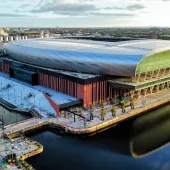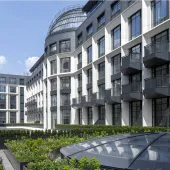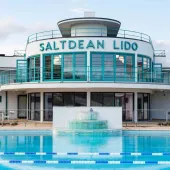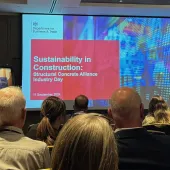Whiteleys redevelopment wins Concrete Society’s top honour
The Concrete Society’s annual Awards for Excellence in Concrete took place on 13th November 2024 at The Royal Lancaster London, celebrating projects that demonstrate outstanding concrete craftsmanship, innovation, and sustainability. Hosted by comedian Hal Cruttenden, the event highlighted impressive applications of concrete across the UK.
Whiteleys redevelopment
The Whiteleys Redevelopment project in Bayswater, London, won the prestigious overall award. The redevelopment, rated as BREEAM 'Excellent', transformed the historic Whiteleys shopping centre into a mixed-use residential and retail space, preserving the building’s Grade II-listed façade. The project involved constructing a deep, three-level basement and a ten-storey superstructure with extensive use of in-situ concrete. The judges praised the engineering, stating that “the permanent engineering on this project was only possible using concrete as a building material.”
The judges highlighted the complex “top-down” basement construction technique, which allowed building above ground while excavation continued below, speeding up the process on the congested site. "The speed of construction on the constrained site – all while retaining the Grade II-listed Portland stone façade, central dome, and grand staircase – was a feat all of its own,” the judges noted.
Project Team
Client: Finchattan
Contractor: Laing O’Rourke
Concrete Supplier: Tarmac
Architect: Foster and Partners
Concrete Specialist: Explore Manufacturing
Structural Engineer: AKT II

Highly Commended projects
Several projects received high commendations, showcasing concrete’s versatility:
TTP Campus, Melbourn: Recognised for its single-storey, collaborative design, the TTP Campus maximised openness and natural light through flat-slab construction. Judges commended the razor-thin beams, blade columns, and uniform finishes, calling the concrete “some of the best and most consistent we have ever seen.”

Lost Shore Surf Resort, Edinburgh: This project created Europe’s largest wave pool within a 10,500m³ reinforced concrete structure. The judges praised the collaboration with Heriot-Watt University to create a floating concrete slab designed to resist shrinkage. The project successfully removed over two million tonnes of carbon from its final concrete mix.

Reciprocal House, Hampstead, London: This four-storey house retained an industrial feel while achieving a refined finish. The exposed aggregate floors, sloping walls, and passive design were highlights, with the judges admiring how the design “blends into the surrounding area while offering privacy and access to light.”

The Peninsula London: A new luxury hotel in central London, the project used top-down basement construction and post-tensioned concrete slabs to achieve high-quality finishes. The judges noted the attention to detail, especially in the façade’s precast stone panels.

Everton FC Stadium, Bramley Moore Dock: Everton’s new stadium received acclaim for its high-quality precast terracing units. The judges noted the units’ durability and appearance, adding that the “brick cladding reflects the surrounding historic structures.”

Supporting Industry Awards
The Concrete Repair Association also presented an award at the event, recognising RH Partnership Architects, Cemplas, and Mapei for their work on Saltdean Lido.
This complex heritage project involved restoring the iconic 1930s Grade II-listed building, which had suffered extensive concrete corrosion from its coastal location and the use of sea-dredged aggregate. The project’s guiding principle was to retain and repair as much of the original fabric as possible while authentically replicating key components.

This year’s awards showcase concrete’s essential role in the UK’s most challenging and innovative construction projects, from residential homes to large-scale infrastructure, highlighting both sustainable practices and complex engineering feats.







